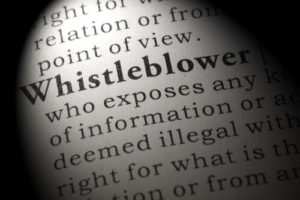A Better Approach for Encouraging Would-Be Whistleblowers to Stand Up and Be Heard

There is a clear recognition these days that whistleblowers play a critical role in rooting out fraud and misconduct. That is why Congress has passed an ever-increasing array of legislation aimed at protecting and rewarding whistleblowers.
There is the False Claims Act, which rewards and protects whistleblowers who report fraud against the federal government. A majority of states have passed analogous state False Claims Act statutes. There is the SEC Whistleblower Program, which rewards and protects whistleblowers who report violations of the securities laws. And there is the Motor Vehicle Safety Whistleblower Act, which rewards and protects whistleblowers who report safety-related defects in automobiles and truck and their component parts.
Just last month, Congress passed the Anti-Money Laundering Whistleblower Program, which rewards and protects whistleblowers who report violations of the Bank Secrecy Act, the primary AML enforcement law. There is even the Act to Prevent Pollution from Ships, which rewards and protects whistleblowers who report illegal ocean dumping.
Just to name a few of the growing number of laws and rewards programs aimed at encouraging whistleblowers to say something when they see something that rubs against their moral compass. But despite this well-spring of whistleblower incentives and protections, the vast majority of individuals continue to abide by the so-called bystander effect, refusing to speak up in the face of workplace wrongdoing.
The primary reason for this recalcitrance is fear of retaliation. We have come a long way in moving away from the “nobody likes a snitch” mentality and embracing whistleblowers for all they do. But the sad truth is that for many companies, the norm for dealing with whistleblowers stubbornly remains ignoring, silencing, and ultimately punishing them for speaking out against what they see as foul play or injustice.
A recent article in Harvard Business Review makes this point loud and clear, citing a study showing 82% of whistleblowers suffered some kind of harassment, with 60% of them losing their jobs. The piece also summarized the findings of a study the author conducted to assess what companies are doing wrong in how they deal with whistleblowers and what a better approach might be to best encourage whistleblowers.
In terms of what they are doing wrong, the author pointed to “three common mistakes or assumptions that companies make in combating misconduct.” They essentially revolve around companies using an overly narrow and rigid set of compliance tools, and a misappreciation for what drives a whistleblower and the personality type most predisposed to speak out.
In terms of how companies could do a better job of encouraging whistleblowers, the author offered “seven interconnected strategies to nudge people to speak up.” They are based largely on a mixture of common sense and what the author describes as emotion-based triggers:
- Make it easy and safe to report wrongdoing.
- Create a culture of transparency and tolerance.
- Promote whistleblowing as a shared goal that benefits everyone.
- Reward whistleblowing with recognition, not rebuke.
- Cultivate company leaders and influencers as champions for speaking up.
- Celebrate those who have spoken up, “pre-suading” others to follow suit.
- Create an atmosphere where whistleblowing is the new norm.
Nothing too surprising or controversial here. It all basically boils down to creating a top-to bottom corporate culture that embraces the importance of whistleblowers and provides the necessary tools and mindset to make it happen.
Eliminating any form of backlash or retaliation against whistleblowers is clearly the best place to start. So is openly punishing wrongdoers, no matter their seniority. These two actions alone will go a very long way in softening, if not completely eliminating the bystander effect, which for many companies still stands in the way of the most meaningful, enjoyable, and productive workplace.
Read More:
- How to Choose the Best Whistleblower Attorney for You
- False Claims Act
- State and Local False Claims Acts
- Whistleblower Protection Laws
- Whistleblower Reward Laws
- Whistleblower FAQs
- Contact Our Whistleblower Attorneys
Tagged in: FCA Federal, FCA State, Importance of Whistleblowers, Whistleblower Eligibility, Whistleblower Protection Laws, Whistleblower Rewards,